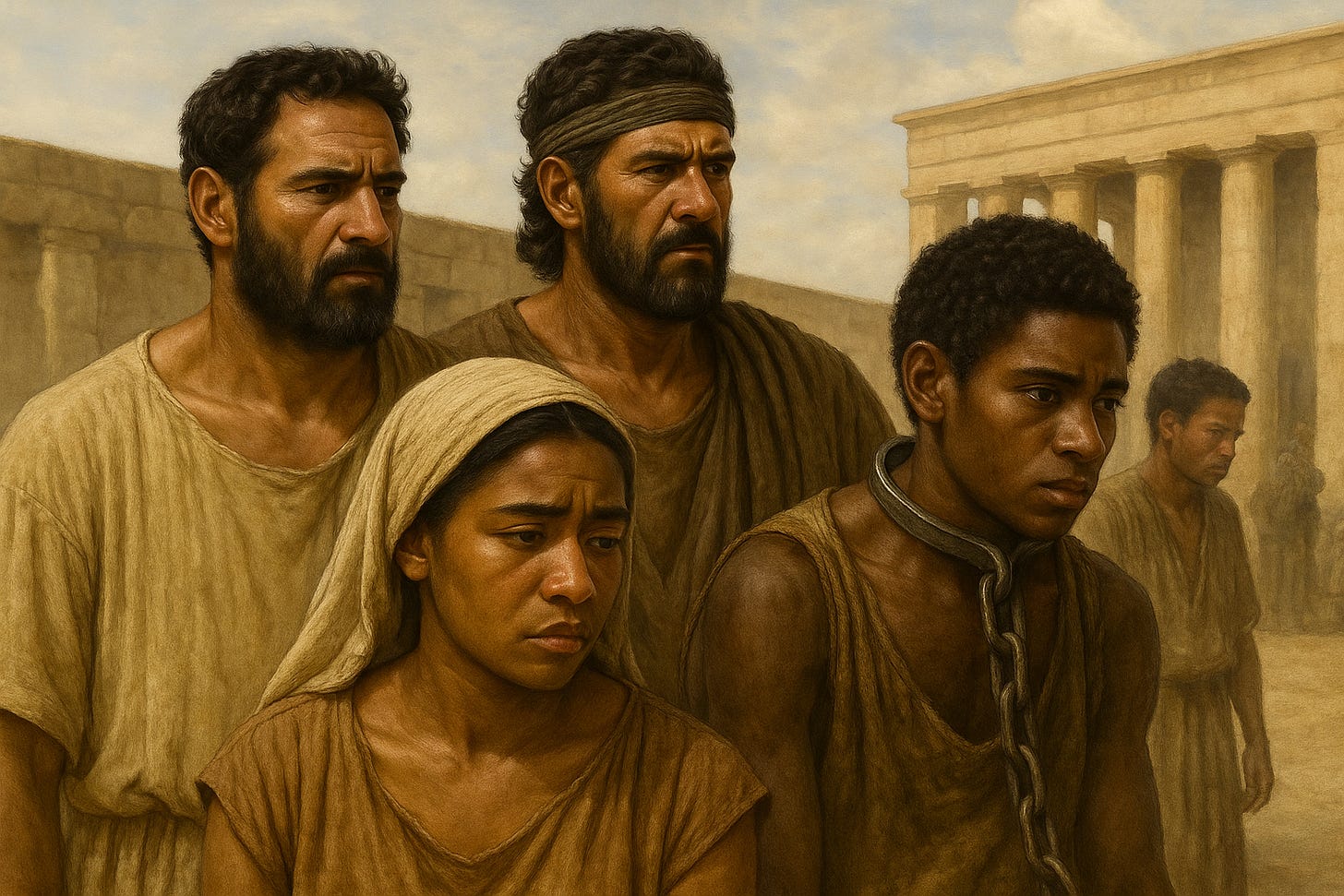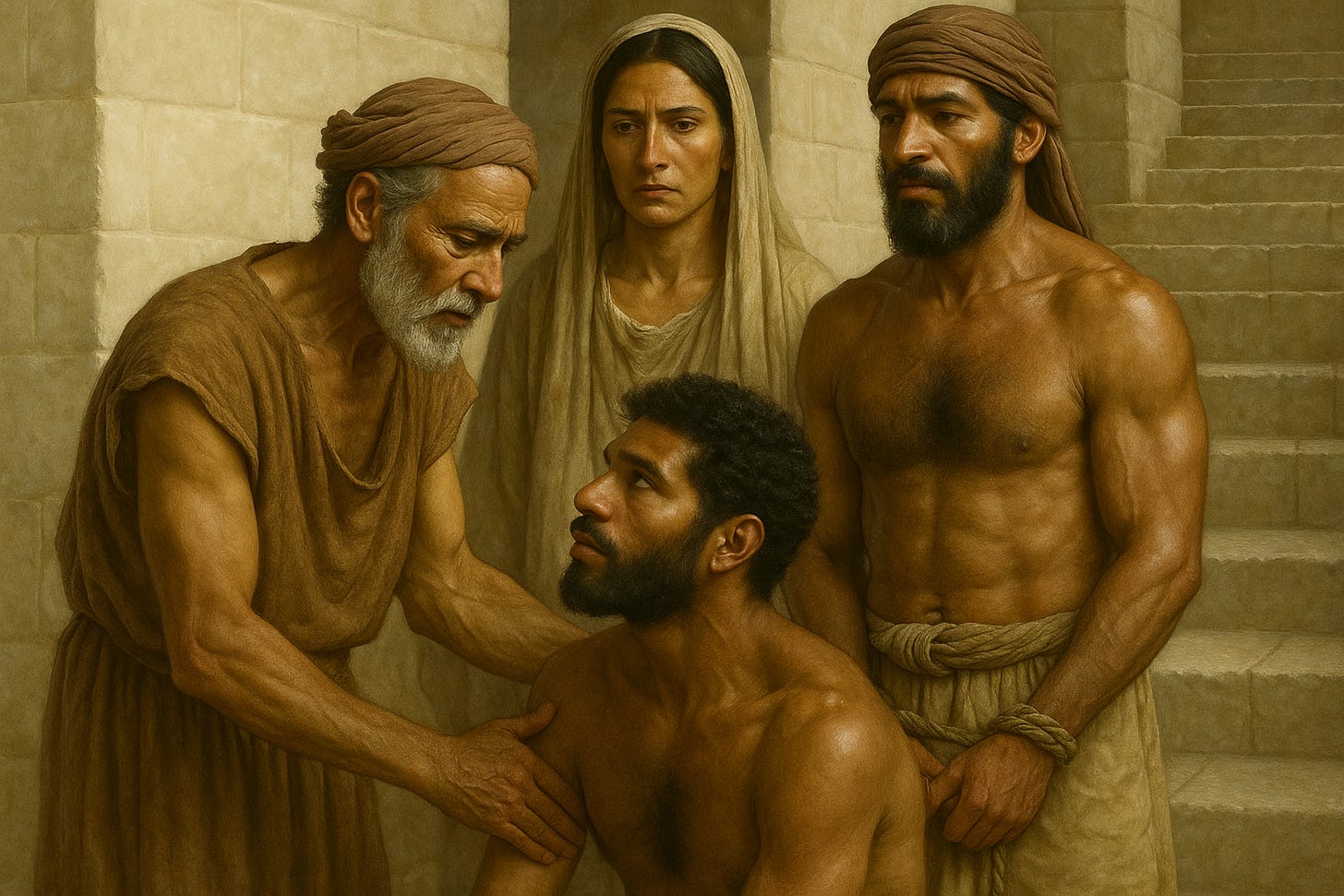The Bible, Slavery, and a Revolution of the Heart
How the gospel planted the seeds to dismantle oppression.
You’re reading Qonversation Qafé, a space for thoughtful dialogue about things that matter. Grab your drink of choice—I’ve got a hot tea tonight—and let’s dive into one of the toughest questions in faith:
What does the Bible really say about slavery?
If you’ve ever read the Bible, you’ve hit those passages. The ones that make you pause, lower your screen, and think, “Wait, how does this work?” In Exodus, Leviticus, and Ephesians, there are rules and instructions about servants and masters. For a modern reader, shaped by the horrors of the transatlantic slave trade, this is profoundly unsettling. It feels like a contradiction to a God of love and liberation.

So, what’s the truth?
Is this a divine endorsement of oppression?
Or is there a deeper story being told?
First, we have to time-travel. The word “slavery” in the ancient Near East and Roman Empire conjured a reality far different from the race-based chattel slavery of the 17th-19th centuries. It was often a form of indentured servitude or debt bondage—a brutal, yet common, economic survival mechanism. People sold themselves to avoid starvation or to pay off debts.
Into this fallen system, God speaks. But he doesn’t start with a sweeping abolition decree. Instead, the Mosaic Law does something fascinating: it regulates the institution to radically protect human dignity.
Hebrew servants were to be freed after six years.
If a master injured a slave, even knocking out a tooth, the slave was immediately granted freedom (Exodus 21:26-27).
Runaway slaves were not to be returned to their masters (Deuteronomy 23:15-16).
Everyone, including servants, was commanded to rest on the Sabbath.
These were revolutionary restraints on human cruelty. The law wasn’t creating a perfect system; it was meeting a broken one where it was, establishing a foundational principle: even those at the bottom of the social hierarchy are image-bearers of God and deserve protection.
This was the first step.
But the story doesn’t end there.
When we turn to the New Testament, we enter the world of the Roman Empire, a society built on a vast and ruthless slave economy. The apostles’ primary mission wasn’t to lead a political revolt but to proclaim the gospel of Jesus Christ. Yet, within that message was a truth so radical it would inevitably dismantle the very foundations of oppression.
Look at Paul’s instructions. He tells slaves to serve faithfully, but then he turns to masters and says something that would have been utterly shocking:
“Masters, treat your slaves in the same way. Do not threaten them, since you know that he who is both their Master and yours is in heaven, and there is no favoritism with him.” (Ephesians 6:9)
Did you see it?
The “master’s” absolute power is stripped away. He is suddenly under authority. He and his slave answer to the same Master. This levels the playing field in a way no law ever could.
Then there’s the case of Onesimus, a runaway slave. Paul sends him back to his owner, Philemon, with a letter. But he doesn’t appeal to Philemon’s legal rights; he appeals to their shared brotherhood in Christ:
“Welcome him not as a slave, but better than a slave, as a dear brother… Both as a man and as a brother in the Lord.” (Philemon 1:16)
The gospel doesn’t just tweak the master-slave dynamic; it completely re-frames it. Their primary identity is no longer defined by a social hierarchy but by their equal standing “in Christ.”
This is the revolution of the heart. The most famous verse in this conversation is Galatians 3:28:
“There is neither Jew nor Gentile, neither slave nor free, nor is there male and female, for you are all one in Christ Jesus.”
In God’s new family, the world’s categories of value, status, and power are rendered obsolete. This was a tectonic shift in human consciousness. The gospel introduced a virus of equality into the body of a slave-based society, and it was only a matter of time before the system would become terminally ill.
So, why didn’t the Bible just say “thou shalt not own a person”?
It’s the right question. The answer seems to be that God works within the hard-heartedness of humanity, gradually moving us toward his perfect standard. He first establishes justice within a broken system, then sends his Son to change the hearts that perpetuate the system. The trajectory of the entire biblical narrative is from oppression to liberation, from regulation to reconciliation.
The tragedy of history is that many used the Bible’s regulations to justify their oppression, ignoring its overwhelming trajectory toward freedom. They plucked verses out of the context of the whole story—a story that begins with God hearing the cry of slaves in Egypt and culminates in Christ liberating us from our slavery to sin.
The truth is that the gospel is the most powerful force for human liberation the world has ever seen. It might not always change structures as fast as we want, but it irrevocably changes hearts. And changed hearts will, inevitably, change the world.
Let's Qonverse.
This is a heavy topic, and I’d love to hear your thoughtful reflections. How have you wrestled with these passages? What brings you peace or helps you to pause?
Sip slowly, think deeply, and talk kindly.
Yours,
Sapphire Kharyzma
Qocktail Pairing Suggestion: An Old Fashioned. A classic drink with complex history, made with care to transform strong, base elements into something refined. Much like this conversation.



